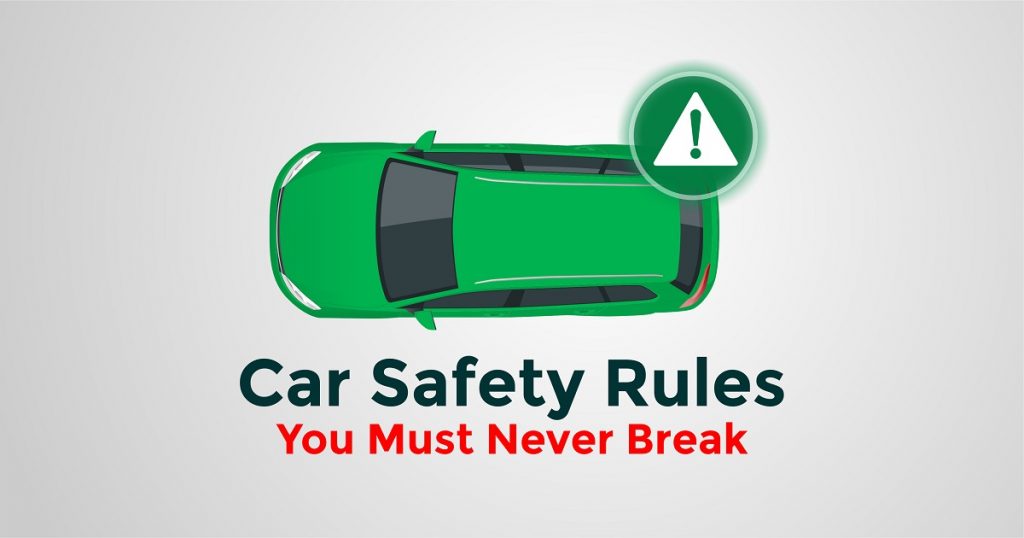Car manufacturers have continued to raise the bar to ensure they meet the taste of modern car users in terms of durability and comfort. They have continued to churn out sophisticated and computerised vehicles that are breath-taking and beautiful with unique safety measures to keep them running smoothly and to give advance warnings in cases of potential trouble.
However, all these measures will come to zero if you continue to do certain things to your car. Here is a list of things you should never do to your car if you are keen on upholding the rules of safety.
1. Never Ignore Warning Lights
Different cars are built with different warning signs but they all have one thing in common – They are colour-coded. Blue or green light could be an indication that a particular system is activated, while a yellow light is most times a call to check or service something. The colour is a signal to something that needs to be immediately addressed.
Warning lights are meant to alert car users to something that is wrong with the car. These lights also serve as preventive measures against a total breakdown of your vehicle. It is important you get your car looked at by a mechanic once the warning lights or check engine alert comes on.
2. Never Put Off Recommended Maintenance
Car manufacturers are of the habit of developing manuals for every car so that the cars can last longer when the guidelines in the manual are thoroughly followed. It is for this same reason that you should never ignore the recommended maintenance for the model, age and mileage of your car if you want it to continue to run smoothly and problem-free. It also saves you from the burden of paying for big repairs in the future.
3. Never Abandon Air Filter
The fuel efficiency of your car is tied to the air filter. A new air filter ensures a smooth running engine and fuel efficiency. In some manufacturer’s handbooks, the air filter should be replaced every 20,000 to 25,000 kilometres. Failure to replace your air filter as recommended may result in drastic consequences for your car engine.
4. Don’t Rev Your Engine Warm on Cold Days
The need to warm your car was prevalent in the days of carburettors, which took care of the warming. These days, with the advent of modern gasoline vehicles, most car users are advised by manufacturers to start their cars and drive ‘softly’ to avert extra wear and tear.
5. Don’t Neglect Oil Change Schedule
A lot of components in your car owe their efficiency to the oil that lubricates them, thereby, allowing them to run smoothly. However, when you fail to replace the oil for more than 3 months or 6 months for synthetic oil, you are giving the oil a chance to thicken and cause avoidable damage.
6. Don’t Ignore Tyre Pressure Warnings
Tyre pressure warnings alert you to issues relating to tyre pressure, which is just as dangerous as many other warning signs that your car alerts you to. Ignoring this sign makes your car unsafe for driving and affects fuel efficiency. Some vehicles have tyre pressure requirements written on the driver side door post so you can know the amount of air to give the tyres.
7. Never Disconnect Battery Cable to Test Alternator
Cars manufactured before the 1970s could tolerate this but with more modern cars, equipped with computers and electronics, it is a bad idea to disconnect a battery cable while the engine is running to test the alternator in your car. With old cars, if the engine continued to run after disconnecting the battery, it is proof that the alternator is working.
But never try this with modern cars. Disconnecting a battery cable while the engine is still in full blast could cause the alternator to spike a 25-125-volt surge within 40mins after the removal of the cable. While this won’t be harmful to an old car without the computerised accessories, it could cause the computers and electronics in the new models to fry instantaneously. Test your alternator with a voltmeter to avoid this unnecessary trouble.
Final Thoughts on Car Safety
There are many other things you should avoid if you want to maximise the enjoyment that your car has to deliver. Not running your car when the fuel tank is empty is one of them. You should also avoid overfilling the engine.
Also, you should avoid attaching many keys to the ignition key. This could lead to the damage of your ignition switch over time. The more you are conscious of these issues, the better for your car and its resale value, especially if you plan to sell it at some point.
By the way, if you are interested in getting a car loan in Nigeria, you can get started by applying for one from Cheki Finance. Get started here.

